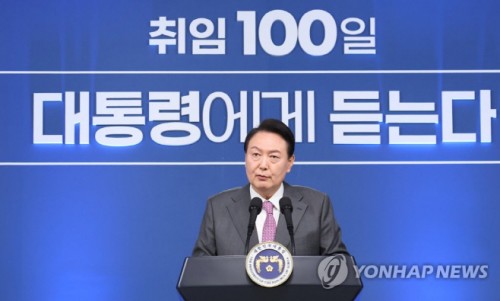 |
| President Yoon Suk-yeol holds a press conference at the Yongsan presidential office in Seoul on August 17, 2022./ Source: Yonhap News |
President Yoon Suk-yeol held a press conference at the presidential office in Yongsan on Wednesday to mark his first 100 days in office. The president said he has been hectic since taking office, and that there have been cheers and rebukes. “The beginning, direction and goals of my administration concern only the well-being of the people,” he said.
While he refrained from evaluating his 100 days in office, it was a journey to change the country’s major framework. The Yoon administration returned the Blue House back to the public, opening the Yongsan era, but what is more meaningful is that it normalized the framework of state affairs within a short period of time.
The three most important changes in such a framework are the normalization of liberal democracy and the market economy, the normalization of the US-Korea relationship, and the normalization of the nuclear power phase-out policy.
First, the normalization of liberal democracy and the market economy means putting Yoon’s ‘liberty’ at the forefront of state affairs. Under the previous Moon Jae-in administration, there was a movement to actually remove the term ‘liberal’ from ‘liberal democracy’ in the constitution, raising concerns. The Yoon administration completely dispelled such concerns. In his inaugural address on May 10, Yoon declared the need to rediscover the value of ‘liberty’ and declared ‘the normalization of liberal democracy and the market economy’, putting liberal democracy as the basic value of the Republic of Korea.
Second, the Yoon administration abolished the Moon Jae-in administration’s ‘income-led growth’ initiative and put forward the ‘private-led growth’ initiative, which refers to the normalization of the market economy. Due to the previous administration’s income-led growth initiative, many self-employed suffered greatly as the minimum wage was raised excessively. During the press conference, Yoon said his administration abolished the Moon administration’s income-led growth while guaranteeing maximum freedom to the private sector and supporting the private sector’s self-innovation.
Next, the people clearly felt the change in the framework of normalization of Korea-US relations. Yoon held a summit with US President Joe Biden, who made an unusual visit to Seoul within 10 days of Yoon’s inauguration. Through the summit, the Korea-US alliance, which had been weakened by the previous administration, was strengthened and was upgraded to a comprehensive strategic alliance that includes not only security but also the economy.
Yoon has formalized participation in the US-led Indo-Pacific Economic Framework (IPEF). He also attended the NATO summit in Madrid and delivered a speech in front of NATO member countries for the first time as a Korean president, enhancing national prestige. The trilateral cooperation between South Korea, the United States and Japan is becoming essential as the world is tending to block with value alliance and supply chain alliances being connected. Yoon said he has been working hard to repair relations with Japan.
Yoon said the defense industry will be also developed as a future industry, revealing that the country now exports weapons to Australia and Poland by expanding value alliances with countries that share the value of liberal democracy.
Third, the Yoon administration normalized the previous administration’s nuclear energy phase-out policy. The Moon administration pushed to shift away from nuclear power supply and increased the proportion of new and renewable energy sources such as solar and wind power. It had been under fire after an audit report revealed that it underestimated the economic feasibility of operation of Wolsong Nuclear Plant unit 1 in order to push for its early shutdown. The nuclear power phase-out policy is considered one of the main reasons for accumulated deficit of the Korean electric power corporation (KEPCO). Besides, there were many criticisms that the country made a mistake of abolishing its own world-class future food industry called ‘nuclear power plant’.
The Yoon administration has focused its efforts on restoring the devastated nuclear power plant ecosystem since its launch. For rapid restoration of the ecosystem, the government has placed an early order for work and providing support for the export of nuclear power plants. At the Yoon-Biden summit in May, Yoon signed a nuclear power alliance with Biden, where he agreed to transfer nuclear power plant technology and cooperate in exporting nuclear power plants. In June, Yoon attended the NATO summit, where he actively discussed nuclear power deals with Czech and Poland. Following the Yoon administration’s strong ‘normalization of nuclear power plants’, the top 10 conglomerates are joining the development projects of the next-generation small modular nuclear power plants (SMR).
Many detailed policies sought by the Yoon administration will be carried out within the major frame of normalization of liberal democracy and market economy. Regulation reforms that create a business-friendly environment, and fiscal reforms that increase disposable income that the private sector can use for investment and consumption by reducing taxes and government spending are also part of the means for normalization of market economy that guarantees maximum autonomy for businesses.
The Yoon administration’s 100 days was a relatively short period of time, but was an important journey that changed the major framework of state affairs, which was completely different from the Moon administration. We hope that the Yoon administration will mobilize various means, such as regulatory reform, tax reform, fiscal reform, pension reform, and labor reform, in order to achieve normalization of liberal democracy and market economy.
#liberal democracy #market economy #normalization #Yoon Suk-yeol
Copyright by Asiatoday
Most Read
-
1
-
2
-
3
-
4
-
5
-
6
-
7





















